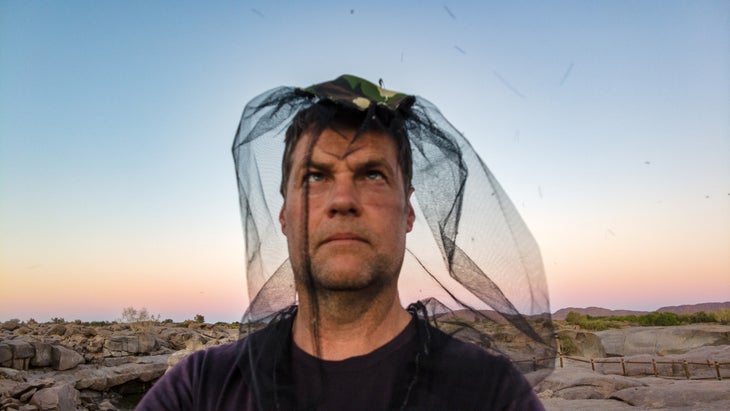Products You May Like
Get full access to Outside Learn, our online education hub featuring in-depth fitness, nutrition, and adventure courses and more than 2,000 instructional videos when you sign up for Outside+
Sign up for Outside+ today.
At best, mosquitoes are a nuisance on an otherwise perfect backcountry outing. At worst, a whining swarm can spoil the entire trek. Armed with tiny sensors that detect heat, sweat, and even your breath, skeeters sport tools perfectly adapted to help them make a meal out of unprepared hikers. Here’s how to beat summer’s winged scourge and avoid mosquito bites.
How to Avoid Bites
Plan your big trips around the buggy season.
Head to the Northwoods in July and August, and to Alaska in late August and September—by which time mosquitoes have usually died off. Ask rangers when mosquito numbers peak, and steer clear. Also consider seasonal conditions: Bugs will be worse after a wet, warm spring than in drier, cooler years.
Cook and hike when the bugs relent.
Even if that means hitting the trail before dawn and waiting until after sunset to emerge from your tent and make dinner, it’ll be worth it to avoid mosquito bites.
Camp (and take breaks) in breezy spots.
High ridges, passes, or peninsulas are generally skeeter-free zones. Avoid bug havens like standing water—even small snowmelt puddles—and groves of trees.
How to Outsmart Mosquitos

Cover up.
Go for light colors, tightly woven fabrics, and long sleeves to help avoid mosquito bites. Protect your ankles by tucking your pants into your socks or wearing gaiters. Mosquitoes really bad? Rick Rochelle, a NOLS guide in Alaska, swears by a headnet (look for cheap, effective models at an Army surplus store, and wear a billed cap under it to keep the mesh off of your face) and the proboscis-proof Bug Shirt ($80, bugshirt.com), a densely woven, lightweight windshell with a built-in headnet.
Repel ’em.
Our go-to bug dope is DEET, but the Centers for Disease Control and Prevention also recommend picaridin and oil of lemon eucalyptus. Apply to all exposed skin, including your face and neck (spray hands and wipe, then wash your hands). The higher the concentration of DEET, the longer it’ll last—from about an hour for five-percent-DEET formulas to more than five hours for the 24-percent variety (reapply when bugs start biting again). Skip scented lotions and soaps, and clean up when you reach camp: Mosquitoes are attracted to sweat.
Pro Tip
Try this guide trick from John Schiefelbein, owner of North Country Canoe Outfitters in Ely, Minnesota to avoid mosquito bites: Make sure you’re the first in any line of hikers. “That way, you walk in the cool air, and you leave a heat signature behind you,” he says. “The people behind are going to get bitten.”
Originally published in 2009; last updated in April 2022
